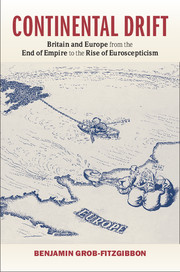Book contents
- Frontmatter
- Dedication
- Contents
- Acknowledgements
- List of abbreviations
- Introduction
- Part 1 Imperial Europeans
- 1 A world undone
- 2 Mr Churchill's Europe
- 3 Mr Bevin's response
- 4 The German problem
- 5 A disunited Europe?
- 6 The continental surprise and the fall of the Labour government
- 7 The realities of government
- 8 Perfidious Gaul
- 9 The decline and fall of the imperial Europeans
- Part 2 Post-imperial Eurosceptics
- Conclusion: Post-imperial Britain and the rise of Euroscepticism
- Notes
- Bibliography
- Index
9 - The decline and fall of the imperial Europeans
from Part 1 - Imperial Europeans
Published online by Cambridge University Press: 05 May 2016
- Frontmatter
- Dedication
- Contents
- Acknowledgements
- List of abbreviations
- Introduction
- Part 1 Imperial Europeans
- 1 A world undone
- 2 Mr Churchill's Europe
- 3 Mr Bevin's response
- 4 The German problem
- 5 A disunited Europe?
- 6 The continental surprise and the fall of the Labour government
- 7 The realities of government
- 8 Perfidious Gaul
- 9 The decline and fall of the imperial Europeans
- Part 2 Post-imperial Eurosceptics
- Conclusion: Post-imperial Britain and the rise of Euroscepticism
- Notes
- Bibliography
- Index
Summary
When Anthony Eden entered the House of Commons as Prime Minister on 6 April 1955, he was greeted with a standing ovation. Although this was a parliamentary tradition for any new premier, it was perhaps just a little bit more satisfying for Eden. He had, after all, been waiting a long time for this moment; thirteen years earlier, Churchill had even written to George VI telling him that should he (Churchill) die in the course of carrying out his wartime duties, the King should ‘entrust the formation of a new Government to Mr. Anthony Eden, the Secretary of State for Foreign Affairs, who is in my mind the outstanding Minister in the largest political party in the House of Commons and in the National Government over which I have the honour to preside’. As Sir Evelyn Shuckburgh noted in his diary, ‘It is a relief that one can now revert to admiring W[inston] for what he has done and been, and not worry about what he is doing or will do. … The “myth” will now take over, and none will want to listen to the carping voice or the awkward derogatory fact. … The great thing is that he has gone from the active scene and can be a great man again without damage’.
Eden's ascent of the greasy pole brought few changes to the government. He moved Macmillan from the Ministry of Defence to the Foreign Office and promoted Selwyn Lloyd from the Ministry of Supply to Defence, but he left Butler as Chancellor of the Exchequer, Lloyd George as Home Secretary, Lennox-Boyd as Colonial Secretary, Thorneycroft as President of the Board of Trade and Duncan Sandys as Minister of Housing. It was the leader of the government rather than his cabinet that had been replaced, and Eden's ministry would be one of continuity rather than change.
Nevertheless, the emergence of a fresh leader at the head of the party provided an immediate up-tick in Conservative fortunes. Given that the last General Election was held in October 1951, Eden was not required to request a dissolution of Parliament until October 1956, but he decided to go to the country earlier rather than later, setting the date at 26 May 1955. The Labour Party was in a buoyant mood, and a Gallup Poll in early May suggested that it was in a strong position to regain control of the government.
- Type
- Chapter
- Information
- Continental DriftBritain and Europe from the End of Empire to the Rise of Euroscepticism, pp. 202 - 222Publisher: Cambridge University PressPrint publication year: 2016



